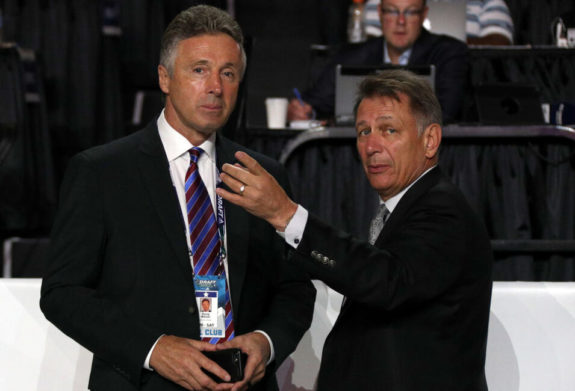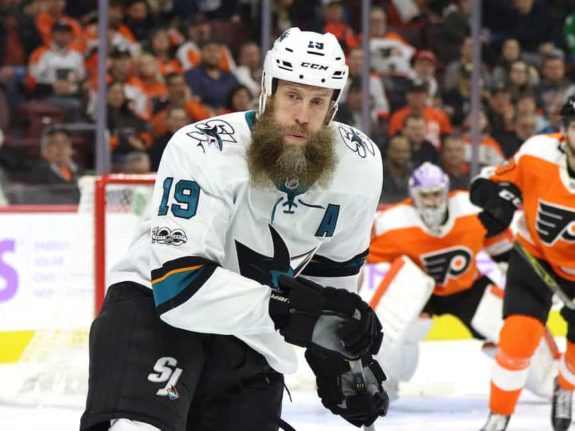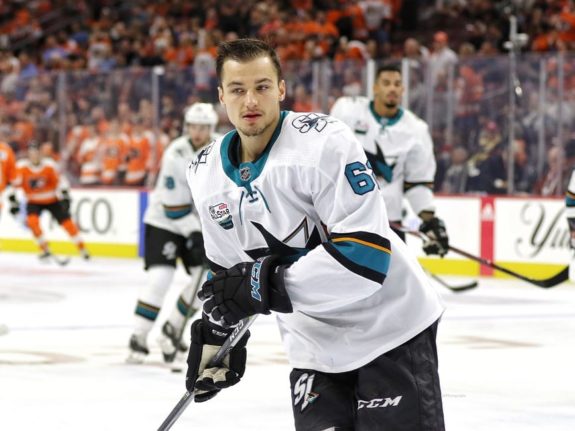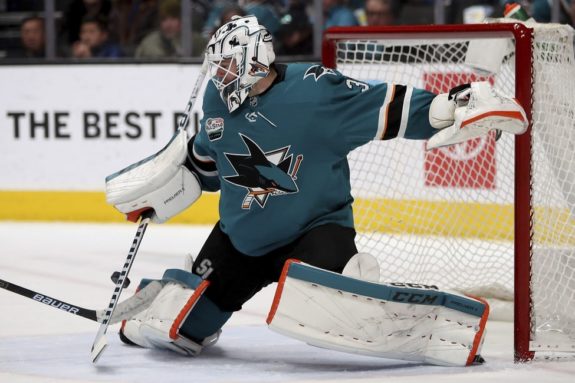As outlandish as an NHL season without the playoffs
seems, that goes double for general manager Doug Wilson’s San Jose Sharks.
Since Wilson took the reins of the
franchise in 2003, they’ve just about always made the postseason, with only one
non-playoff campaign up to now (2014-15). The Sharks then turned around and
reached the Stanley Cup Final for the first time in franchise history in 2016.

So, while the last-place Sharks are in no position to make them again, even if play resumes under some new kind of 24-team playoff format, there is still hope. Wilson remains one of the best GMs in the league. If he can address the following offseason priorities, the Sharks also have a shot to rebound next season:
3. Re-Sign Joe Thornton… or Not?
It used to be a given Joe Thornton would remain with the Sharks up until the point at which he would retire. However, with Thornton reportedly set to return for another season at least, Wilson has to assess his options and balance the potential cap hit with the diminishing returns in the offense department.
The facts are as follows: A pending unrestricted free agent, Thornton will be 41 this summer. He just scored the fewest points (31) since his rookie season, with the 14th-most ice time on the team (15:30 per game). That includes a full 2:05 per game on the man advantage, with which he was only able to score eight power-play points. In 2018-19, he scored 15 points in 1:54 per game.

In his defense, Thornton’s 2:05 ranked eighth and the eight points ranked seventh. Furthermore, the unit as a whole could stand to improve somewhat, as its 17.5% efficiency ranked 23rd in the league.
It begs the question though: Is Thornton’s spot on the team taking time away from someone else who can improve it? Even if his cap hit was a manageable $2 million last season and he’s been beyond flexible from that perspective in the past, his deal may not be what’s preventing the relationship from working any longer.
Assuming Wilson can make the right moves this summer, the Sharks arguably remain Thornton’s best shot at a Stanley Cup. Wilson has to determine whether or not he is theirs, when cap space is scarce and he has other free agents to worry about, some of whom are due for raises. Thornton may not figure into the latter category, but Wilson has to determine if he even fits into the former.
2. Find Room to Re-Sign Kevin Labanc
Any other offseason, re-signing Thornton
probably would have been the top priority. With his decline and the emergence
of forward Kevin Labanc, especially last season, that is no longer the case.
Admittedly, Labanc took a step back from a production standpoint. He scored 17 goals and 56 points last season. He was on pace for 16 markers and just 39 points over 82 games this one. Maybe Wilson knew something everyone else didn’t, when he somehow got the then-restricted-free-agent Labanc to re-sign for just $1 million last July.

Chances are good it’s an aberration,
though. Labanc’s production had increased steadily each season in his career
and the ravaged-by-injury Sharks were snake-bitten all season long, ranking 28th
in the league in goals (180). If you exclude the historically bad Detroit Red
Wings (142), they were just four away from holding down the next-worst spot.
Regardless, the 24-year-old Labanc remains a big part of the Sharks’ offense of the future, in theory. He’s an RFA again and it would be foolhardy asset management not to keep him in the fold. Even if his point totals weren’t as impressive, he still deserves a raise, considering the likes of Marcus Sorensen (18 points; $1.5 million) and Melker Karlsson (12 points; $2 million) each make more.
The trick is determining from where the
space will come. Aside from Thornton, Labanc is the highest-profile free agent
the Sharks have got. Anyone else potentially coming off the books won’t make
that much of a dent and, as much as scoring was an issue, Wilson has bigger
fish to fry trying to improve his team.
1. Address Martin Jones’ Goaltending
Even with the lack of goal-scoring, no position hurt the Sharks this past season as much as its goaltending, specifically No. 1 goalie Martin Jones’. While Jones’ play hit a wall last season, he didn’t so much bounce back as he did bounce off it the other way and get worse.
Jones’ save percentage remained at a putrid
.896 and his goals-against average stayed at around the same horrible level
(3.00 vs. 2.94 last season). However, his overall effectiveness decreased
considerably. In 2018-19, he was still 36-19-5 and was still able to lead the
Sharks to a third-round appearance in the playoffs.

No dice, this time around. He went 17-21-2 and started losing starts to backup Aaron Dell down the stretch. Jones played eight games since February. Dell played 10.
Now, Dell wasn’t exactly a game-breaker by any stretch. His GAA was 3.01, although his .907 save percentage approached respectable levels. What’s most telling is how, despite playing eight less games overall, Dell held a higher goalie-point share than Jones (5.3 vs. 4.8), meaning he was statistically responsible for more points in the standings.
For comparison purposes, the league leader was Winnipeg Jets netminder Connor Hellebuyck with 12.5. It’s a particularly forgiving stat as long as the goalie is playing well, despite the quality of the team in front of him. For example, Montreal Canadiens goalie Carey Price ranked No. 3 (9.8). New Jersey Devils goalie Mackenzie Blackwood ranked No. 6 (9.0).
That’s the bad news. The worse news is, at
age 30 and clearly already in decline, Jones is under contract for four more
seasons with a modified no-trade clause, whereby he can submit a three-team
trade list.
Thankfully, Jones’ cap hit is a relatively manageable $5.75 million. With Dell’s $1.9 million potentially coming off the books, it would at least be easy to move on and replace him with a cost-effective alternative to at least platoon in and out with Jones, if Wilson can’t outright replace his No.1 that is. The ball is in his court at this point. Anything to keep the puck out of the Sharks’ net.